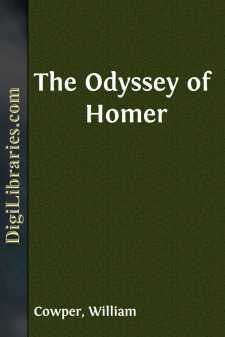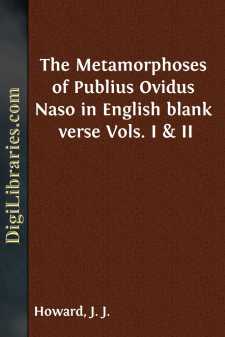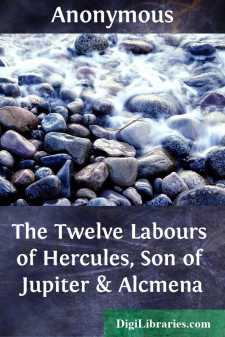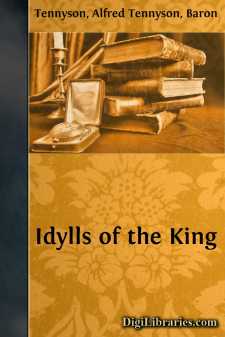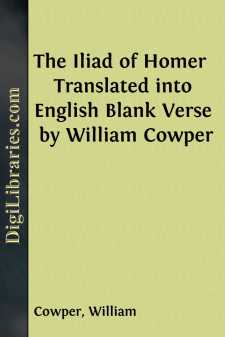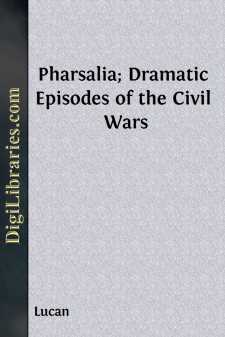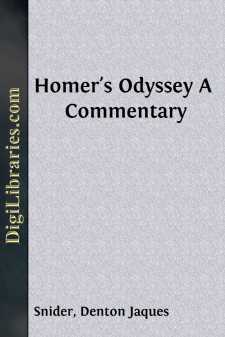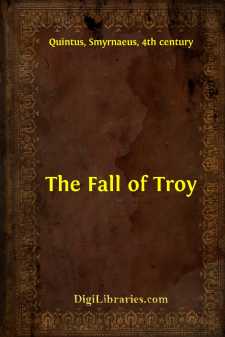Poetry
- American 96
- Ancient, Classical & Medieval
- Asian 15
- Australian & Oceanian 11
- Canadian 11
- Caribbean & Latin American 5
- Children's Poetry & Nursery rhymes 51
- Continental European 11
- English, Irish, Scottish, Welsh 162
- General 483
- Inspirational & Religious 7
- Middle Eastern 3
Ancient, Classical & Medieval Books
Sort by:
by:
William Cowper
ARGUMENT In a council of the Gods, Minerva calls their attention to Ulysses, still a wanderer. They resolve to grant him a safe return to Ithaca. Minerva descends to encourage Telemachus, and in the form of Mentes directs him in what manner to proceed. Throughout this book the extravagance and profligacy of the suitors are occasionally suggested.Muse make the man thy theme, for shrewdness famedAnd...
more...
by:
J. J. Howard
THEFirst BookOF THEMETAMORPHOSESOFOVID. From bodies various form'd, mutative shapesMy Muse would sing:—Celestial powers give aid!From you those changes sprung,—inspire my pen;Connect each period of my venturous songUnsever'd, from old Chaös' rude misrule,Till now the world beneath Augustus smiles. While yet nor earth nor sea their place possest,Nor that cerulean...
more...
by:
Anonymous
The Nemæan Lion. By Juno's hate urged on, Alcmena's Son,At sixteen years his noble toils begun.Nemæa's dreadful Lion first he sought,The savage slew & to Eurystheus brought,From his huge sides his shaggy spoils he tore,Around him threw, & e'er in triumph wore. 2 On Lerna's pest th' undaunted Hero rushes,With massy club her hundred heads he crushes,In vain. One...
more...
by:
Lodovico Ariosto
This work is a continuation of the "Orlando Innamorato" of Matteo Maria Boiardo, which was left unfinished upon the author's death in 1494. It begins more or less at the point where Boiardo left it. This is a brief synopsis of Boiardo's work, omitting most of the numerous digressions and incidental episodes associated with these events: To the court of King Charlemagne comes Angelica...
more...
And indeed He seems to me Scarce other than my king's ideal knight, 'Who reverenced his conscience as his king; Whose glory was, redressing human wrong; Who spake no slander, no, nor listened to it; Who loved one only and who clave to her—' Her—over all whose realms to their last isle, Commingled with the gloom of imminent...
more...
by:
William Cowper
BOOK I. Achilles sing, O Goddess! Peleus' son;His wrath pernicious, who ten thousand woesCaused to Achaia's host, sent many a soulIllustrious into Ades premature,And Heroes gave (so stood the will of Jove)5To dogs and to all ravening fowls a prey,When fierce dispute had separated onceThe noble Chief Achilles from the sonOf Atreus, Agamemnon, King of men. Who them to strife impell'd? What...
more...
by:
Lucan
BOOK I THE CROSSING OF THE RUBICON Wars worse than civil on Emathian (1) plains,And crime let loose we sing; how Rome's high racePlunged in her vitals her victorious sword;Armies akin embattled, with the forceOf all the shaken earth bent on the fray;And burst asunder, to the common guilt,A kingdom's compact; eagle with eagle met,Standard to standard, spear opposed to spear. Whence, citizens,...
more...
VENUS AND ADONIS EVEN as the sun with purple-colour'd faceHad ta'en his last leave of the weeping morn,Rose-cheek'd Adonis tried him to the chase;Hunting he lov'd, but love he laugh'd to scorn; 4Sick-thoughted Venus makes amain unto him,And like a bold-fac'd suitor 'gins to woo him. 'Thrice fairer than myself,' thus she began,'The field's chief...
more...
HOMER'S ODYSSEY. BOOK FIRST—INTRODUCTION. The Odyssey starts by organizing itself; it maps out its own structure in what may be called a General Introduction. Herein lies a significant difference between it and the Iliad, which has simply an Invocation to the Muse, and then leaps into the thick of the action. The Iliad, accordingly, does not formulate its own organization, which fact has been...
more...
Homer's "Iliad" begins towards the close of the last of the ten years of the Trojan War: its incidents extend over some fifty days only, and it ends with the burial of Hector. The things which came before and after were told by other bards, who between them narrated the whole "cycle" of the events of the war, and so were called the Cyclic Poets. Of their works none have survived;...
more...


